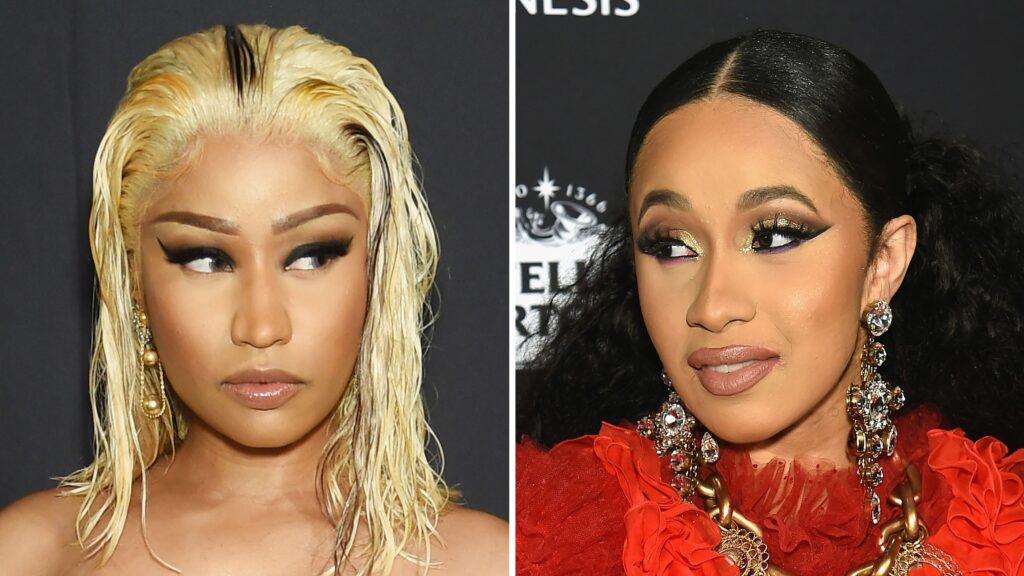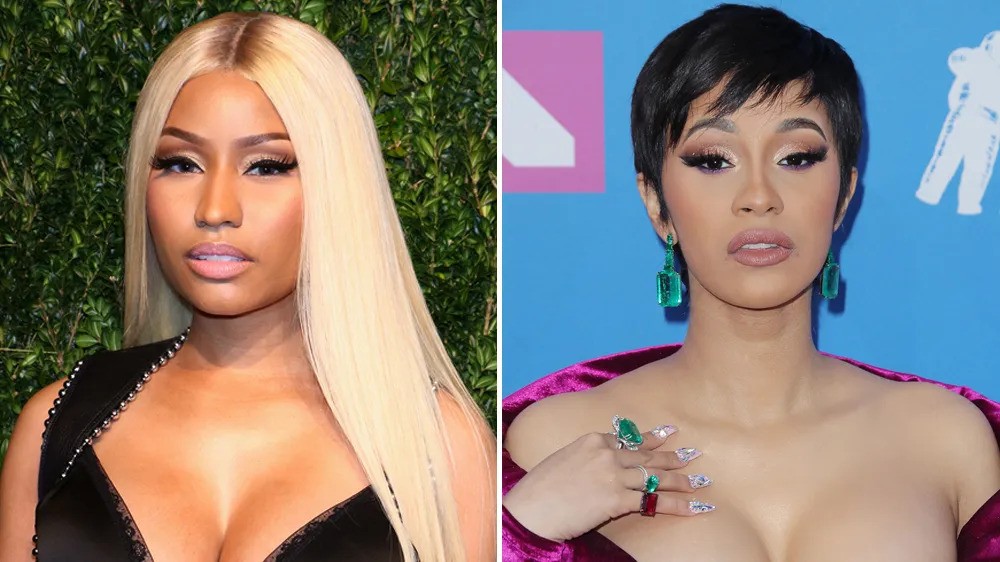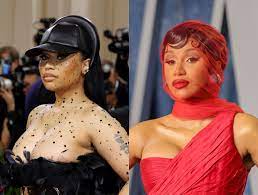Hey everyone, welcome! Nicki Minaj is currently on fire because she’s had enough of not getting the recognition and respect she deserves. Recently, she took to Instagram to share some footage from Jermaine Dupri’s show, “The Rap Game”. In the clip, an interviewer asked female rappers on the show to name influencers other than Nicki Minaj, which seemed pretty odd to me.
The interviewer directed this question specifically to the ladies, saying, “If you want to make it in this industry, unfortunately, you don’t have many role models to look up to, because I wouldn’t say Nicki would be your role model. Or would she? That’s not really a question.” Then she went on to say that if Nicki was indeed their role model, she’d be surprised, and suggested other inspirations like Remy Ma from Newark, New Jersey. She emphasized figures like Queen Latifah and Remy Ma, highlighting their ability to challenge the male-dominated industry and assert their power.
Ricky, I’ve noticed you mention Nicki Minaj countless times, but today you mentioned Queen Latifah. Not that there’s anything wrong with that, but it caught my attention. You usually bring up Tiana Taylor and Nicki Minaj from Star magazine, so Queen Latifah was unexpected.

It seems like the pressure to name another female rapper besides Nicki Minaj might have influenced this young girl’s response. Sometimes interviewers push for different answers, which can be uncomfortable. Nicki Minaj wasn’t pleased with this and took to Instagram to call out the interviewer. Here’s what she said: “Look at all the hate and bitterness on this black woman’s face when somebody says their influence is the most dominating female rapper of the last decade. Shall all you girls do this? So sad. Even male artists gotta pretend in interviews now. Child, laughing my tail off. If you’re this weak-minded, you won’t last in this game anyway. This is what’s going on behind the scenes at award shows, radio shows, etc. They gotta say they was influenced by people who was rapping before they was born. Child, anything but those ten little letters on a big sign: Nicki Minaj.”
Nicki took to Instagram Live to share her thoughts: “Originally, I wasn’t planning to host Queen Radio for two weeks, but some new developments came up. Now I’m considering it. However, it’s frustrating to see some girls who claim to admire me, look up to me, yet when they get on the mic or in interviews, they mention everyone but me. Let’s take a moment of silence for these clowns. They deserve a big pair of red, floppy shoes and a red nose. Seriously, it’s ridiculous. I’ll always give credit to those who keep it real. Just imagine if male rappers couldn’t say they were influenced by Lil Wayne. It’s insane, right? They’d have to cite Big Daddy Kane or KRS-One instead. These are legends, no doubt, but why can’t they acknowledge Lil Wayne too? Anyway, stay tuned for Queen Radio. I’ve got some guests lined up, and trust me, the pettiness will be on another level. Taking notes, so don’t miss out!”
However, despite all that, I’m feeling really upbeat, folks, and I just want to express my love for all of you. To those who’ve been supporting me through thick and thin, hang tight—it’s going to be worth it. Yeah, you heard it right, it’s definitely going to be worth the wait. Alright, catch you later.

That was a brief live session from Nicki, addressing that video. And let me tell you, I think she’s got a valid point. If someone inspires you, why not acknowledge it? But sadly, the politics of the industry often muddy the waters. Mentioning Nicki Minaj can sometimes ruffle feathers, leading some artists to stay mum to avoid souring relationships with those who aren’t fans of Nicki. Plus, there’s media influence at play too. Take the lady in the video Nicki shared, for instance. She took to Instagram claiming she didn’t want young girls listening to Nicki Minaj. She stated, “So Nicki posted about me today. This video was over a year old, but I stand by what I said. Nicki isn’t for young girls, maybe for adult women, okay, but young girls should know better.” This interviewer, named Kym Ford, pressured the young girl, Lyric Change, aka Rikki, to name someone other than Nicki as her influence. People attacked Rikki, which was awful considering her age. However, someone came to her defense, rightly saying, “Don’t attack her. She was coerced into changing her answer. That’s the real issue.” Rikki agreed, stating, “Exactly.” People need to understand that I was only 13 when the show was filmed, and now I’m 16. At 13, under pressure from adults, it’s natural to want to change my answer, even though it was right for me at the time.
Nicki Minaj responded to this on the Neighborhood Talk Instagram page, defending Rikki, saying, “She’s sweet and she’s the victim here. Did nothing wrong. Just a kid. The bitter grown woman is simply twisted.”
I understand that Nicki Minaj feels frustrated when she’s not given credit for her influence, especially by some in the industry. However, it might be best for her to redirect her energy away from those who won’t acknowledge her impact. Not everyone draws inspiration from Nicki, and not everyone will recognize her contributions. Yet, many female rappers have openly praised her. Take, for instance, these words of admiration: “Nicki Minaj is undeniably influential, groundbreaking, and a driving force in this new generation of female rap. Her bars, punchlines, and iconic voice have left a lasting impression on me. She’s been my inspiration since I was young, and I wanted everyone to know that. Nicki Minaj has a massive following, and while I didn’t expect her to see my tribute, I wanted my friends to understand where I draw some of my inspiration from. She’s at the top of my list because she’s had the longest and most impactful career among female rappers. She took elements from those who came before her and elevated them to new heights. Her energy and style make me feel empowered. When she emerged, she revitalized my belief in female rap. She showed me that there’s always room for fresh talent and new perspectives. Nicki Minaj has been a constant presence in my life, shaping my taste in music and inspiring me to pursue my dreams. It’s surreal to think that someone I idolized as a kid now knows who I am.”
Several female rappers have acknowledged Nicki Minaj for paving the way for them in the industry. This brings me to another point: Cardi B recently stated in an interview with Tidal that she also played a significant role in opening doors for current female rappers.
“In my opinion, I believe that after my breakthrough, it became somewhat easier for many female artists. Previously, there were very few female rappers signed to major labels. Well, at least the ones who were already established; they weren’t getting signed. But now, it seems like everyone’s getting signed if they can rap and have a decent following, because nobody wants to miss out on an opportunity. Many labels and individuals overlooked me initially—I approached several of them, and they all rejected me. But now, they’re realizing the value they missed.”
Cardi B faced some criticism following this interview, prompting her to take to Twitter to clarify her statements. She emphasized that while she didn’t claim to have paved the way for female rappers, she did bring hope to marginalized communities and women. She highlighted the lack of collaboration between established artists and female rappers, noting that labels often sidelined them. Cardi B pointed out the prevalent belief that only one female rapper could succeed at a time, hindering opportunities for others. She acknowledged the shift in the industry, with more male artists now collaborating with female rappers. She stressed that her intention wasn’t to suggest she alone inspired female rappers, as women have always possessed talent, but rather to address the industry’s historical neglect and hostility towards them.
She also stated, “Let’s be honest, I’m just being facetious here. Can anyone point out significant opportunities offered to female rappers? Which record label actively promoted a female rapper? Which mainstream music programs featured female rappers? We’re talking just two prominent female rappers over four years, and even that seems stretched. So, enlighten me. I’m eager to see evidence. No matter how I phrase it, there’s always someone ready to twist my words into negativity because of their disdain for Cardi. Yet, they struggle to present a single magazine feature, major festival appearance, or noteworthy male-female collaboration involving a female rapper from 2008 to 2017, apart from one exception. It seems some folks are slow on the uptake, as I’ve never disrespected any female rappers predating my era. The momentum dwindled due to lack of support, only to resurge around ’08, yet the industry imposed a limiting belief that only one female rapper could thrive at a time. Now, thankfully, there’s a plethora of talent emerging.”
That was quite the statement, but Cardi makes some valid observations about the challenges female rappers face in the music industry. Historically, the industry hasn’t shown much enthusiasm for promoting female rap talent, often citing doubts about profitability. However, Cardi’s meteoric rise has forced a reevaluation. Suddenly, there’s recognition that there’s a lucrative market for female rappers, prompting labels to take notice and invest in them. Ultimately, it boils down to financial incentives.
Moreover, there’s been a reluctance to invest in female rappers due to fears of competing with established figures like Nicki Minaj. Nicki entered the scene at a time when female rap was less prominent, allowing her to carve out a dominant position in the mainstream. For years, she was the sole female rapper consistently dominating charts. While there were other rising talents during her reign, such as Young M.A. with hits like “Ooouuu”, they struggled to maintain their momentum. Dej Loaf also enjoyed success with tracks like “Try Me”, but similarly faced challenges sustaining her career trajectory. Additionally, artists like Tink, who possess a blend of singing and rapping skills, faced obstacles due to unfavorable label situations, hindering their potential breakout moments.
So, there was also a loss of momentum for another artist. Then there’s Azealia Banks, undeniably talented, but her potential mainstream success was hindered by her erratic behavior. And of course, Iggy Azalea, one of the few female rappers to break into the mainstream alongside Nicki Minaj in recent years. However, her credibility was questioned due to her lyrical content and style. It’s still bewildering. Another artist worth mentioning is Dreezy, who saw some moderate success but lacked the necessary industry support. Throughout the past decade, Nicki Minaj has been the consistent force in female rap. Cardi B did shake things up upon her arrival, but the true pioneers who inspired the current generation are the legends: Nicki Minaj, Lil’ Kim, Missy Elliott, MC Lyte, Salt-N-Pepa, Queen Latifah, Lauryn Hill, Foxy Brown, Trina, Left Eye, Remy Ma, and many more. Nicki Minaj, in particular, has raised the bar for female rappers. So, when discussing trailblazers, it’s these women who deserve recognition. Those are my thoughts on the matter. Feel free to share your opinions in the comments below. Don’t forget to like, comment, subscribe, and share this video. Thanks for watching, and until next time, take care. Goodbye.
